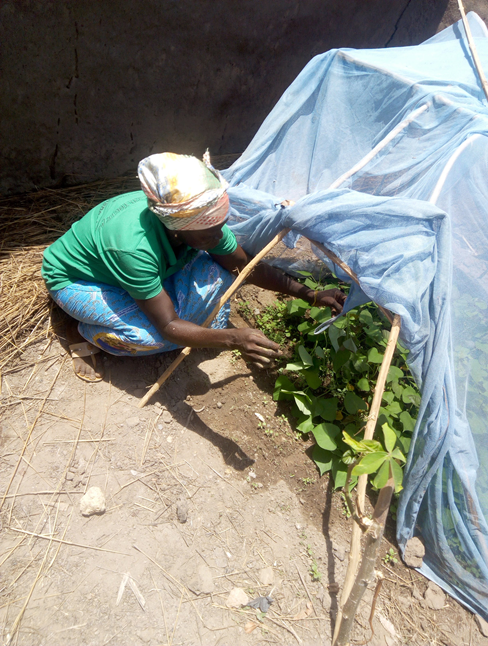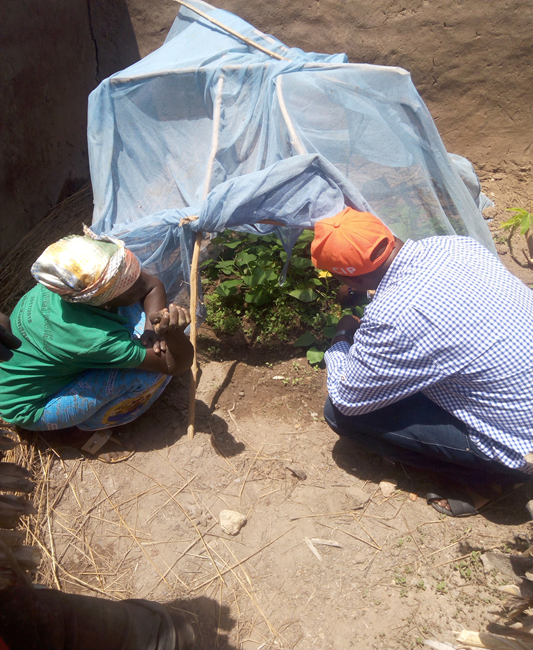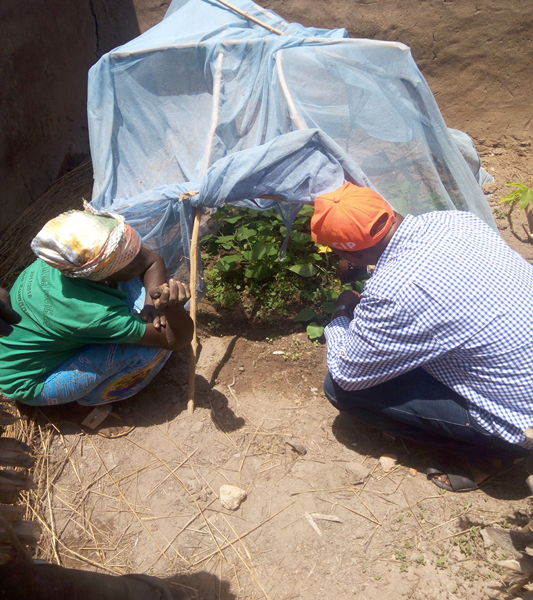
Martha shows her first-ever seed vines during a monitoring visit by CIP and ISRD Team. Photo credit Philemon Dong-Uuro
Martha Lawrance is a 49-year-old woman from the Chogsia, Wa West District of the Upper West Region in Ghana. She and her husband have four children with the youngest being under five years of age. Three years ago, Martha was introduced to orange-fleshed sweetpotato (OFSP) through women groups programs that worked with a local NGO, Innovations for Sustainable Rural Development (ISRD), on a supplementary feeding project targeting children under five largely due to high vitamin A deficiency levels in the region. Martha was among the early adopters of this root crop. She began by cultivating OFSP on a very small scale for roots to feed her children and today has graduated to be a reputable vine multiplier in the district.
At that time Martha’s main source of income was the cultivation and sale of soya beans. She knew little about the economic potential of OFSP and had not thought about cultivation on a large scale due to challenges with the storage of harvested roots and accessing of large quantities of vines in time for planting. However, when the International Potato Center (CIP) Triple-S Scaling project was introduced to her group in 2018, she saw an opportunity, especially because at that time, demand for OFSP roots was increasing. She attended trainings conducted by CIP together with ISRD during the women group meetings. Trainings were done using videos, flip charts and practical demonstrations that covered: harvesting, selecting and storing sweetpotato roots; storage in the sand for sprouting; producing quality sweetpotato vines, among other topics. As Martha was keen, she quickly grasped the methodology and went to try it in her home. Her enthusiasm during the trainings paid off as she was able to successfully expand her OFSP production to about a quarter of an acre, from a small kitchen garden, and even stood out as a champion farmer in the Wa West District. As a result, the District Directorate of Agriculture nominated her for the District Best OFSP Farmer, an award she received during the 2018 National Farmers Day celebration in Meteu.
In the first planting season of 2019, Martha was among the first decentralized vine multipliers (DVMs) to sprout her OFSP roots from Triple-S. She then multiplied vines rapidly, being careful to follow all the recommended agronomic practices she had learned.

Martha shows her first-ever seed vines during a monitoring visit by CIP and ISRD Team. Photo credit Philemon Dong-Uuro
“…I followed all that they taught us, and I must confess that it has yielded good results. I am even surprised at how the vines are growing” She emphasized as she took the CIP and ISRD team around her farm to see the progress.
In order to successfully multiply enough vines for sale and for her planting in her plot, Martha carefully planted out sprouted roots six weeks before the rains in a covered structure constructed using local materials. The cover was to protect the plants from high temperatures that would have otherwise dried them out. She then watered the plants every 2 days to ensure they had sufficient moisture for quick growth. Once the plants were ready for harvesting, Martha sold seed vines to her customers.
So far Martha has supplied planting materials to other women farmers in three communities, Chogsia, Solimbo and Gyinuokoraa, earning her GHC 3650 (USD 670). A total of 85 farmers have benefitted from Martha’s seed vines this season. Additionally, Martha now knows how to store her roots until she needs them for household consumption or sells them in the local market. Currently, she has increased her OFSP roots cultivation to half an acre.
“This year I am cultivating half an acre. I have planted some in the backyard and some are also on the other farm. I am not afraid of storage any longer. I know I can store using the sandpit method we were taught. I also tried the basin method, and it was good” she added.
“…now I am earning good money just selling vines at this time of the year when things used to be very hard for me. I should be able to support my husband to buy fertilizer for his maize farm while saving some money for other needs” Martha explained. Now Martha has a significant additional source of income, apart from what she gets from soya.
With women like Martha, farmers can readily access vines. The challenge of arranging the delivery of vines to coincide with rainy days is over for the other farmers as after a heavy downpour, they are able to walk over to Martha’s farm, buy some fresh vines and plant immediately.
Martha is hoping to harvest and store more roots at the end of the season. She plans to become the major supplier of seed vines to farmers in the Wa West District by the next season. She believes she can do it because her husband is very supportive, and has the support of ISRD staff if she faces any challenges.
The Triple S scaling project in Ghana is funded by the RTB scaling fund with additional support from the African Development Bank through the Technologies for African Agricultural Transformation (TAAT) project.
Written by Issahaq Suleman (CIP Triple-S Scaling Champion) and Dong-Uuro Philemon Puordeme (Director, Innovations for Sustainable Rural Development). Edited by Rosemary Kihiu
